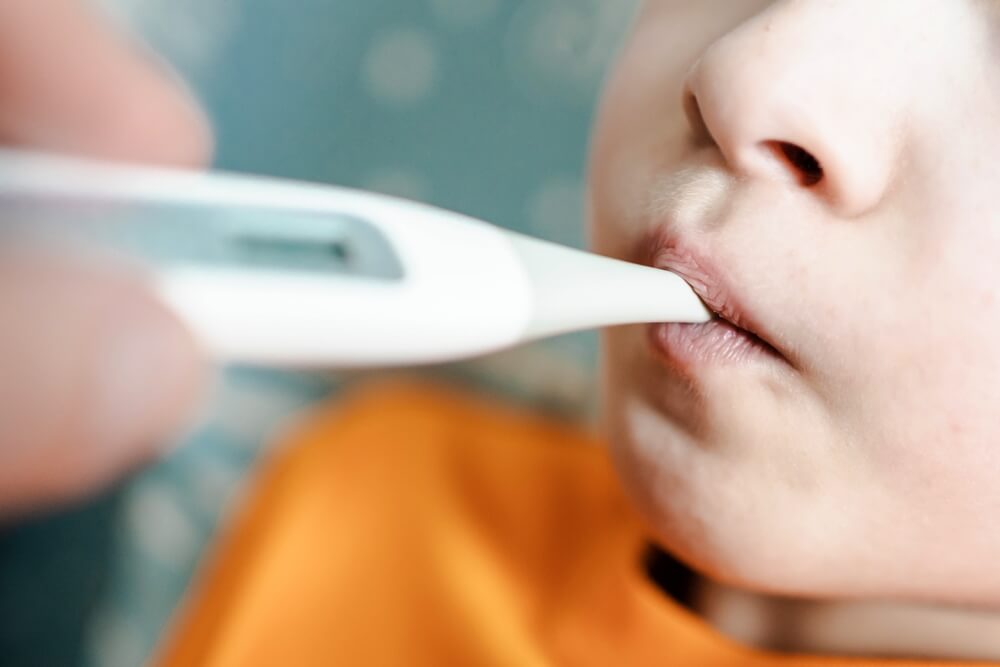Toddler fever is never a good thing. It’s normal for parents to have a knee-jerk reaction, and they might immediately want to reach out to the nearest emergency care center for help. And while it’s true that fevers can be scary, not every instance of a toddler fever will require medical assistance. Still, parents should do something, right? Well, actually, not always.
We here at Children’s Medical Center of South Florida understand that parents are concerned when their child develops a fever, but not all fevers are things to fret about. This is why it’s imperative to know the difference between a fever that can freely run its course and a fever that requires expert help.
As such, in this article, we will discuss things like how to bring down a fever, when to worry about high fever in kids and alarming fever temperatures.
About Fever and Taking Your Child’s Temperature
First, it’s essential to understand that every toddler will eventually experience fever, no matter how careful parents are. Still, it’s vital to know what to do when it occurs.
Before anything else, it is essential to determine if your child has a fever by measuring their temperature. However, the numerous online store or pharmacy options can make it challenging to choose the right thermometer gadget.
There is a broad range of thermometers to choose from, including traditional oral thermometers to more advanced temporal artery scanners.
To that end, rectal thermometers for infants and toddlers are the most accurate, but parents may feel uneasy using them. As such, they are free to use whichever device makes the most sense to them. In older kids, oral temperature will be the most accurate, and chances are, the child will be able to tolerate it.

Toddler Fever: What’s Considered a Fever
The standard body temperature considered “normal” is 98.6 degrees Fahrenheit or 37 degrees Celsius. However, it’s important not to panic if your child’s temperature slightly exceeds this range. Everyone’s temperature naturally fluctuates throughout the day, and it can vary based on factors such as age, activity level, and other individual factors.
The definition of a fever for your child depends on the type of thermometer you use. Different thermometers have varying levels of accuracy. To better interpret the results you observe, referring to a fever chart can be helpful. It provides guidance in understanding the significance of temperature readings.
Fevers That Are “OK”
Sometimes, even a mild fever temperature can make you uneasy, and it’s totally understandable. Still, the truth is that most toddler fevers signal that your child is effectively fighting off germs and everything is normal. In fact, it’s a rather good thing.
So, when you shouldn’t worry about toddler fever?
For the most part, experts say parents shouldn’t worry about mild fevers that last for less than five days in total. Also, such a fever should be disregarded, especially if it doesn’t interfere with your child’s everyday activities.
Still, you might wonder how to bring down a fever. To that end, you can try to reduce the fever with a few simple home remedies:
- Using cold compresses.
- Using rever-reducing medication intended for toddlers and infants, such as acetaminophen.
- Rest.
- Drinking plenty of fluids to prevent dehydration.
Also, a temperature in a child over months up to 104 F shouldn’t be cause for alarm. Again, mild fevers that last up to five days are okay for most kids.
You also don’t need to reduce the fever if your child behaves normally. In these cases, it’s enough to monitor their behavior. You don’t need to worry if they are as playful as they used to be and drink and eat normally. If they are a bit more tired than usual, don’t get alarmed, that’s just a normal symptom of a mild fever.
High Fever In Kids: When To Worry
Let’s address the crucial question: When should you be concerned about a fever? In the following situations, it is advisable to contact your doctor:
Fevers in Infants Under Three Months
Fevers in infants can indicate a severe illness. Additionally, a low temperature in newborns may be a sign of a significant health concern. Contact a healthcare provider if your baby experiences any fever or if their rectal temperature drops below 97.7°F (36.5°C).
High Fever in Infants and Children Over Three Months
If your child’s fever exceeds 104°F (40°C) or does not subside even after administering fever-reducing medication, it is recommended to contact a healthcare provider.
Fever Lasting more Than Five Days in Your Child
If your child’s fever persists for more than five days, your pediatrician may need to investigate further to determine any underlying causes.
Fever Not Responding to Fever-Reducers:
If you can’t bring down your child’s fever with fever-reducing medications, such as acetaminophen, can be used at home with the approval of a healthcare provider. These medications should typically work quickly to reduce your child’s fever. If your child’s fever continues even after administering a fever-reducing medicine, it is essential to consult a doctor.
Your Child Acts Differently
High fever in kids may show in different forms. The following should be considered signs of illness and warrant a trip to the pediatrician:
- They are challenging to get excited or interested in things they otherwise like and enjoy
- They don’t drink enough fluids
- Babies aren’t wetting at least for diapers daily
- Older children won’t urinate every eight to 12 hours.
You’re Simply Concerned
Listening to your instincts can sometimes mean a lot. If you are simply uncomfortable seeing your child with an illness or temperature, discuss it with their pediatrician. Even if it’s nothing concerning, you’ll have peace of mind.

Seizures and High Fever in Kids
Seizures can be a frightening potential complication of fevers in some children. Febrile seizures occur in approximately 2% to 4% of children under the age of 5. It’s important to note that not all seizures involve jerking movements in the body. According to Dr. Lim, some seizures may resemble a loss of consciousness or “passing out.”
If your child experiences a seizure, please follow these steps:
- Place your child on their side.
- Refrain from putting anything in your child’s mouth.
- Call 911 if the seizure persists for more than five minutes.
- If the seizure lasts for fewer than five minutes, contact your physician or seek immediate medical attention.
If You Need Expert Advice
When your child has a fever, feeling uneasy and even scared is normal. However, there are certain cases when the fever simply needs to run its course and will go away independently. Still, it’s completely understandable for parents to have concerns.
That said, if you want to learn more about this topic or explore fever-reducing methods, feel free to schedule an appointment with our experts.
We are more than ready to assist you and guide you apart from providing compassionate pediatric care.


